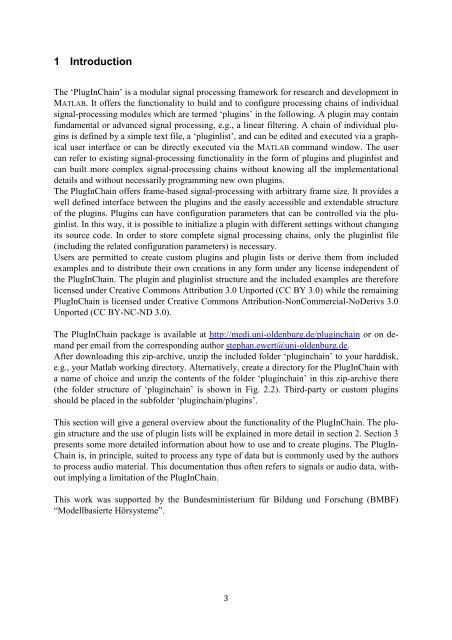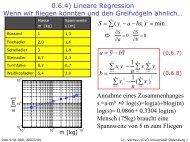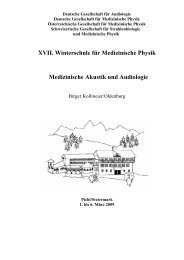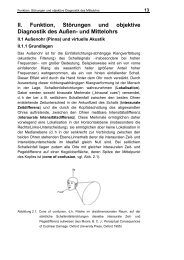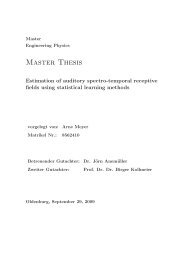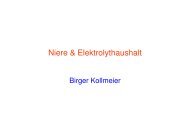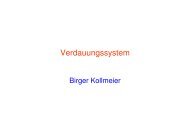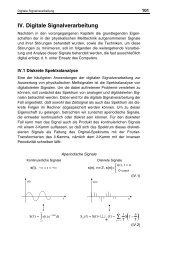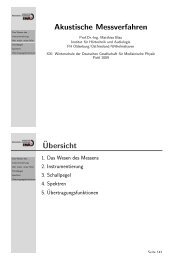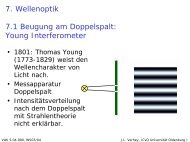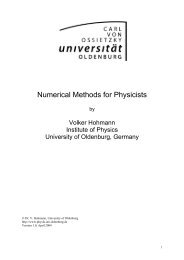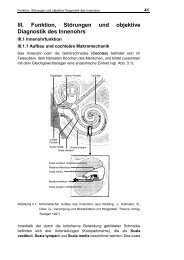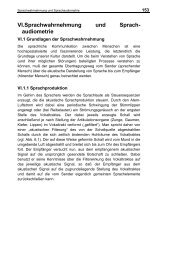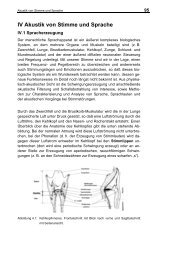PlugInChain documentation - Universität Oldenburg
PlugInChain documentation - Universität Oldenburg
PlugInChain documentation - Universität Oldenburg
You also want an ePaper? Increase the reach of your titles
YUMPU automatically turns print PDFs into web optimized ePapers that Google loves.
1 Introduction<br />
The ‘<strong>PlugInChain</strong>’ is a modular signal processing framework for research and development in<br />
MATLAB. It offers the functionality to build and to configure processing chains of individual<br />
signal-processing modules which are termed ‘plugins’ in the following. A plugin may contain<br />
fundamental or advanced signal processing, e.g., a linear filtering. A chain of individual plugins<br />
is defined by a simple text file, a ‘pluginlist’, and can be edited and executed via a graphical<br />
user interface or can be directly executed via the MATLAB command window. The user<br />
can refer to existing signal-processing functionality in the form of plugins and pluginlist and<br />
can built more complex signal-processing chains without knowing all the implementational<br />
details and without necessarily programming new own plugins.<br />
The <strong>PlugInChain</strong> offers frame-based signal-processing with arbitrary frame size. It provides a<br />
well defined interface between the plugins and the easily accessible and extendable structure<br />
of the plugins. Plugins can have configuration parameters that can be controlled via the pluginlist.<br />
In this way, it is possible to initialize a plugin with different settings without changing<br />
its source code. In order to store complete signal processing chains, only the pluginlist file<br />
(including the related configuration parameters) is necessary.<br />
Users are permitted to create custom plugins and plugin lists or derive them from included<br />
examples and to distribute their own creations in any form under any license independent of<br />
the <strong>PlugInChain</strong>. The plugin and pluginlist structure and the included examples are therefore<br />
licensed under Creative Commons Attribution 3.0 Unported (CC BY 3.0) while the remaining<br />
<strong>PlugInChain</strong> is licensed under Creative Commons Attribution-NonCommercial-NoDerivs 3.0<br />
Unported (CC BY-NC-ND 3.0).<br />
The <strong>PlugInChain</strong> package is available at http://medi.uni-oldenburg.de/pluginchain or on demand<br />
per email from the corresponding author stephan.ewert@uni-oldenburg.de.<br />
After downloading this zip-archive, unzip the included folder ‘pluginchain’ to your harddisk,<br />
e.g., your Matlab working directory. Alternatively, create a directory for the <strong>PlugInChain</strong> with<br />
a name of choice and unzip the contents of the folder ‘pluginchain’ in this zip-archive there<br />
(the folder structure of ‘pluginchain’ is shown in Fig. 2.2). Third-party or custom plugins<br />
should be placed in the subfolder ‘pluginchain/plugins’.<br />
This section will give a general overview about the functionality of the <strong>PlugInChain</strong>. The plugin<br />
structure and the use of plugin lists will be explained in more detail in section 2. Section 3<br />
presents some more detailed information about how to use and to create plugins. The PlugIn-<br />
Chain is, in principle, suited to process any type of data but is commonly used by the authors<br />
to process audio material. This <strong>documentation</strong> thus often refers to signals or audio data, without<br />
implying a limitation of the <strong>PlugInChain</strong>.<br />
This work was supported by the Bundesministerium für Bildung und Forschung (BMBF)<br />
“Modellbasierte Hörsysteme”.<br />
3


